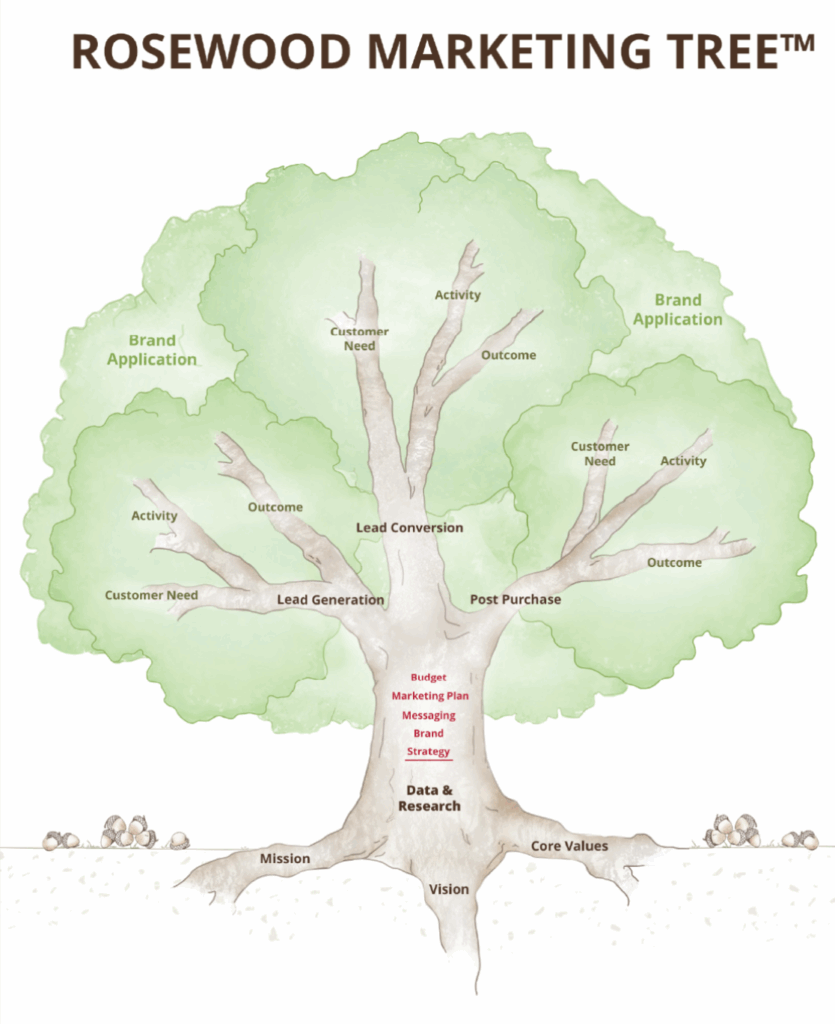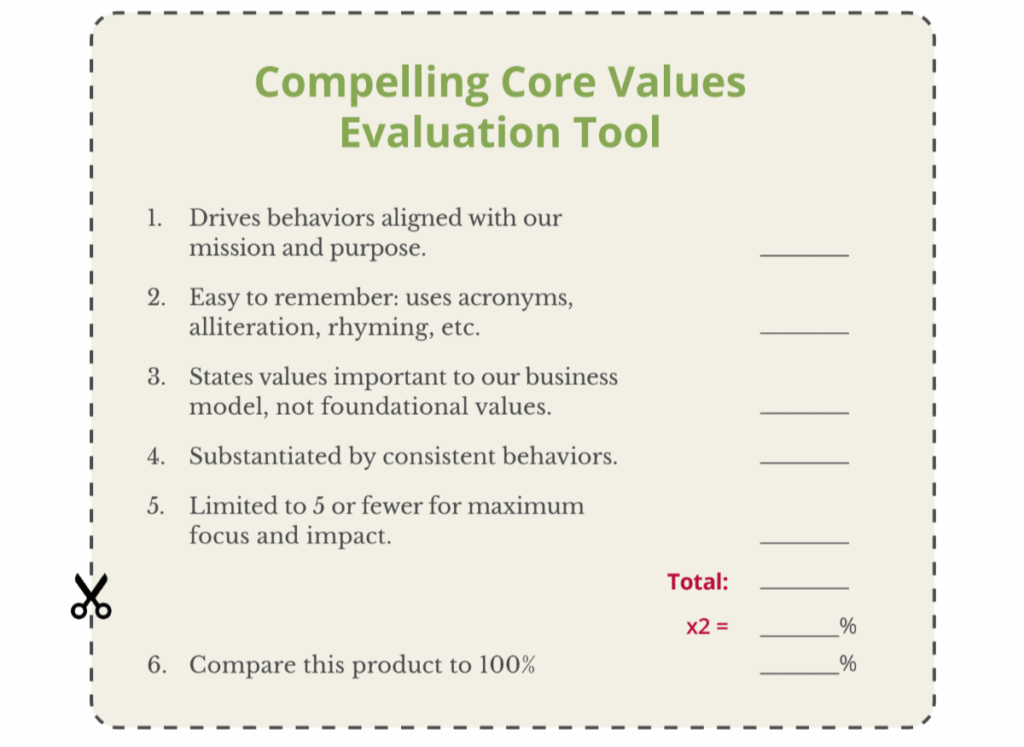Identifying Decision-Making Tools in My Business
In the journey of business, we’ve identified Purpose as the “why” of business. It’s the mountain peak out in the distance that we are driving towards. We’ve identified Mission as the “what” we are doing to accomplish the purpose.
In the illustration below, the mountain peak represents our purpose and why we are on this journey in the first place. The vehicle represents the mission—what we are doing to achieve the purpose. The compass represents our core values and the guidance they give for the journey.

This article focuses on Compelling Core Values. They are the third and final component of the roots of the Marketing Tree. (See diagram.)

What are Core Values?
Values are fundamental priorities that guide choices and actions. Values drive behavior. They can be compared to a compass, which points out the direction of travel. When our actions align with the direction the compass points, good things happen. As core values repeatedly guide our choices, a culture emerges specific to our business. In this way, core values and company culture are closely connected, as one informs the other.
Values are decision-making tools. Everyone holds values that inform their choices. By this definition, even Hitler had values, albeit destructive, selfish, and immoral ones. Contemplating this helps us understand the significance of values and the importance of intentional, correctly chosen decision-making tools.
At Rosewood Marketing, our core values are creativity in problem solving, hunger for personal growth, pursuit of humble excellence, purposeful communication, and passion for client success. For Rosewood to accomplish its purpose and mission, we need to live by these core values. Our clients should be able to count on us to follow these core values as we serve them.
There are two categories of values in business: first, there are general foundational values applicable to everyone everywhere, and secondly, there are company-specific values applicable to your particular business.
1. Foundational Values
Jim Collins has called foundational values such as honesty and integrity “the permission to play values.”1 These foundational values are easily understood, even by a young boy playing a game of marbles. Every lad has his limits regarding his playmates’ behaviors. If those limits are crossed, he collects his marbles and heads home.
Integrity, honesty, keeping one’s word, fairness, and many more are the values that give passage into the game of business. Every business must be guided by these core values, or they will forfeit their right to play and be left alone in the dust with their marbles in disarray. We don’t give “permission to play” to the unscrupulous.
Incidentally, godly people often succeed in business because sound foundational values make up their character and operating principles. It’s why Joseph succeeded in the house of Pharaoh.
Many times, scrupulous core values are why the tide comes in for godly, principled business owners who hire people like them. Those who “fear the Lord and depart from evil,” who “let not mercy and truth forsake [them],” and who “in all [their] ways acknowledge Him” experience “favor and good understanding.” Typically, their “barns are filled with plenty” and their “presses burst out with new wine.”2
Sometimes our neighbors comment that the Plain People have an unfair advantage and their businesses are uncommonly successful. Let’s take the opportunity to point to the Lord and give Him the glory for our success. Moral uprightness is “not of yourselves”; “it is the gift of God” so we should not boast.”3

2. Specific Core Values
The aim of this article is not so much to remind you of what the boys in the neighborhood already intuitively understand. Rather, it is to help you identify the core values native in your business. Once these values are identified, you will know what you really need to protect and promote.
Identifying core values specific to your business requires some serious thinking and observation.
Mike’s Meats’ specific core values will be different from Eddie’s Electric’s. These two businesses have the same foundational values, but they operate in two different industries. One is in the food service industry with manufacturing processes, and the other is in the building trades with a professional service component.
When the founder of Eddie’s Electric moved to a new area of church outreach, he realized that the playing field surrounding his new home already had plenty of electricians. However, most of the existing businesses were not operating from his core values. The surrounding businesses neglected cleanliness, attention to detail, and punctuality (CAPs). Based on his past business experience, Eddie believed these core values would serve people well in his new home area.
So Eddie’s Electric put on their CAPs and successfully relaunched in an already-crowded marketplace. It worked. They still are the only electrical contractor that sweeps the entire house when they’re done at a new construction site. They still carry portable cordless vacuums in every van for cleaning up after themselves in existing homes. That’s clean! Through a system of detailed record keeping, they frequently know more about the progression and conditions of a new construction project than even the builder knows; furthermore, they have almost no workmanship-related callbacks. That’s attentive! They consistently schedule the crews so that no project is begun late or left half finished. They get in on time, see the project through to the finish, and get out. That’s punctual!
The Value of Core Values
Core values affect behavior. When hiring new employees, these core values need to be clearly explained, and a new hire needs to understand them and align with the team in driving these values forward. Eddie expects his workers to exude the habit of cleanliness, removing (without complaint) the plumbers’ shavings and pipe cast-offs when the final sweeping is done. He will require his foremen to pay attention to detail so he can record accurate field notes. The scheduler must understand that he is responsible for getting crews on the job promptly as promised and keeping them there until the project is fully completed. If Eddie’s employees ignore these core values, he will need to help them correct their behavior or let them go. Otherwise, the company becomes compromised.
Core values affect culture. By promoting cleanliness, attention to detail, and punctuality as core values, both clients and employees know what to expect. Their reputation is built on it; for example, Eddie’s Electric is known locally as “the clean guys.” Attention to detail and punctuality are so much a part of their operating system and culture that one contractor said, “If all my subs were as responsible as you, I could build houses from my phone while sitting in Hawaii!”
Core values affect a company’s success. When Eddie’s Electric routinely sweeps new construction projects, it encourages the builder to sequence the job progression properly, scheduling the plumber and HVAC contractors to do their work before the electrician. This sequence is exactly as it ought to be, as wires will always yield right-of-way more easily than pipes and air ducts. Also, there are fewer callbacks to fix wires obstructing other trades, and the home builder gets the debris from all the trades removed in one clean sweep. Relevant job notes prevent the dispatcher from sending crews to a job unnecessarily. Good workmanship benefits the customer and business alike. Punctuality creates an atmosphere of diligence and focus. The results speak for themselves: contractor loyalty is high and success abounds.
Core values affect business transitions. With any business, people move laterally, horizontally, and in and out. Clearly communicated and compelling core values can carry a young, founder-led organization through successful growth-based transitions and even through ownership succession.
Compelling core values drive the following actions:
1. Delivering value to the customer.
2. Defining benchmarks for employee behavior and performance.
3. Communicating focus within an organization.
Remember Mike’s Meats?
Let’s take a look at their core values to see how clearly defined and compelling core values help businesses.
Mike used the power of acronyms to frame his core values: “SMS.” He also used alliteration to develop the three core values he’s adopted for his business: note the repeated use of the letter “f.” These techniques aid greatly in making a business’s core values memorable.
Safety—For food and fingers
Memories—Fondness feeds friendship
Senses—Flavor plus four (smell, touch, sound, sight)
Mike’s Meats is decidedly safety-conscious for both workers and customers. Machines are always fully guarded. Procedures for grinders, stuffers, and knives instruct workers how to do the job without unnecessary risk and injury. Posters appropriately placed around the shop remind workers of safe operations. Employees are permitted to operate forklifts and winches only after proper training.
All workers are required to take food handling courses. A protocol for meat storage and handling is in place and scrupulously followed. Cooling equipment is automatically monitored, and alerts are issued if temperatures exceed established thresholds. Every quarter, employees with no accidents or protocol violations receive a gift card as an award for their attention to safety.
And the customer knows. While unfortunate stories circulate in most localities about butcher shop mistakes and quality control issues, Mike’s emphasis on his core values has resulted in glowing customer approval. And the employees know too. They expect unsafe and unsanitary practices to get called out and conscientious practices to get rewarded.
Regarding memories, Mike’s Meats invites their customers to tell their stories of the hunt. Employees post photographs in the retail store of their own memorable game and livestock experiences. To further emphasize memories, Mike encourages this kind of phone exchange: “Mr. Smith, that elk you harvested up in East Fork is processed.” “Mrs. Miller, Lillian’s doe is now completed.” “Fred, your sons’ hog project is ready for your freezer.” For Mike, meat is about memories, so why not talk with the customer in terms of what it means to them?
Since strong interaction with the senses is part of Mike’s Meats’ core values, everyone constantly evaluates their specialty recipes for snack sticks and pre-seasoned, grill-ready entrees. Every Friday, someone fires up the grill for lunch and either prepares the tried-and-true or ventures into something new and improved. Seasonings, temperature, the smell of the grill, types of wood pellets, and charcoal vs. propane are all debated subjects at Mike’s Meats.
Mike is also concerned that the ambience of the retail and front counter does not insult the senses. Cleanliness, attractive decor, and freshness are addressed daily. Frequently, snack stick samples are available, as are hot bites from the grill on Friday.
The packaging is a detail not to be forgotten either. Mike provides free boxes with his logo and business name prominently presented. Mike chalks it up as advertising, knowing that boxes often get reused, and when they do, his business logo and name get a little more airtime with each use. The full-color labels and ink stampers for labeling even have their own special touch! Things like “Bob’s Elk Steak” and “Jr’s Wild Steer Sticks” show up on labels. Everyone is always on the lookout for new ways to highlight the memories and involve the senses.
Operations at Mike’s Meats are clearly connected to SMS. When things get wobbly and the stress mounts, Mike frequently finds that the trouble is rooted in a violation of a core value. Because the company clearly communicates and upholds shared core values when hiring, employees can reduce stress and regain balance by realigning themselves with those values.
A Final Caution
Your business’s core values should be discovered, not created. They are identified, not invented. This identifying process may be disappointing. You may wish you had a certain core value, but the behavior of your people does not align with that value. For example, I wanted to run a company with a core value of timeliness, but meetings consistently started late. Usually, it was because I wasn’t there on time. Naming “timeliness” as a core value would have discredited the whole exercise of identifying and using core values. Your attempt at using core values to build culture is undermined if you list “wannabe” values.
In summary
What are your core values? Do you know? Does your team know?

Notes:
1. Jim Collins, Harvard Business Review, “Building Your Company’s Vision” as well as other sources. https://hbr.org/1996/09/building-your-companys-vision
2. Selected phrases from Proverbs 3:3-10.
3. Ephesians 2:8-9